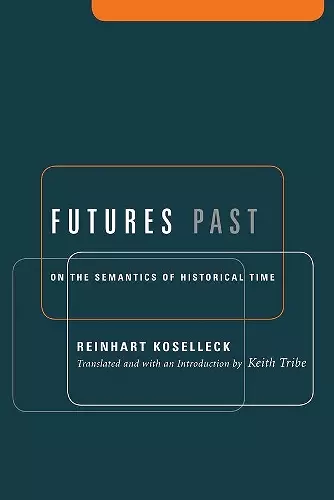Futures Past
On the Semantics of Historical Time
Reinhart Koselleck author Keith Tribe translator
Format:Paperback
Publisher:Columbia University Press
Published:13th Aug '04
Should be back in stock very soon

With a new, interpretive introduction by the translator, this revised edition of Koselleck's most acclaimed work is once again available in English. Koselleck explores the concept of historical time by posing the question: What kind of experience is opened up by the emergence of modernity? Koselleck explores the concept of historical time by posing the question: what kind of experience is opened up by the emergence of modernity?
Explores the shifting perceptions and conceptions of historical time that have emerged over the past two centuries. This book argues that the past and the future have become 'relocated' in relation to each other, and that 'history' has emerged as a kind of temporality with distinct characteristics and ways of assimilating experience.Modernity in the late eighteenth century transformed all domains of European life -intellectual, industrial, and social. Not least affected was the experience of time itself: ever-accelerating change left people with briefer intervals of time in which to gather new experiences and adapt. In this provocative and erudite book Reinhart Koselleck, a distinguished philosopher of history, explores the concept of historical time by posing the question: what kind of experience is opened up by the emergence of modernity? Relying on an extraordinary array of witnesses and texts from politicians, philosophers, theologians, and poets to Renaissance paintings and the dreams of German citizens during the Third Reich, Koselleck shows that, with the advent of modernity, the past and the future became 'relocated' in relation to each other.The promises of modernity -freedom, progress, infinite human improvement -produced a world accelerating toward an unknown and unknowable future within which awaited the possibility of achieving utopian fulfillment. History, Koselleck asserts, emerged in this crucial moment as a new temporality providing distinctly new ways of assimilating experience. In the present context of globalization and its resulting crises, the modern world once again faces a crisis in aligning the experience of past and present. To realize that each present was once an imagined future may help us once again place ourselves within a temporality organized by human thought and humane ends as much as by the contingencies of uncontrolled events.
"Koselleck turns the procedures of 'conceptual historiography' to the study of the concept of history itself, (providing) original, erudite, and illuminating insights into concepts that have informed the modern idea of historical being: event, chance, progress, revolution, modernity... Koselleck's work augurs a new era in the conceptualization not only of what 'history' means to Western culture but also of what Western culture means for 'history.'" -- Hayden White American Historical Review
ISBN: 9780231127714
Dimensions: unknown
Weight: unknown
344 pages